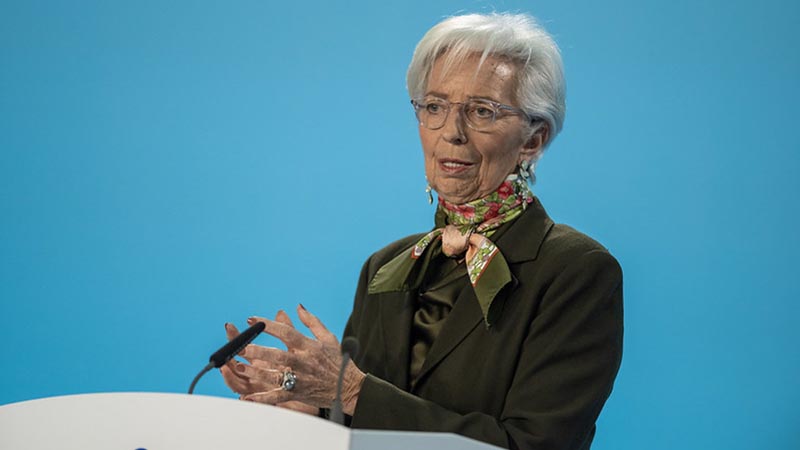The European Central Bank’s decision to hike rates for the 10th consecutive time today (14 September) could tip the EU “further into recessionary territory”, according to some investment professionals, who warn the bloc’s financial squeeze could intensify in Q4 2023 and beyond.
Despite economists being undecided as to whether the ECB would hike rates yesterday, a leaked story on higher projected inflation today meant markets largely expected the increase, which took interest rates from 3.75% to 4% – an all-time high for the EU.
See also: Global dividends hit record £449bn as European equities and banks lead the way
Neil Birrell, chief investment officer at Premier Miton Investors, said the Bank’s decision to hike was “probably a relatively easy decision for them” given it has stated inflation has been “too high for too long”.
“However, they also need to prevent any optimism on rates coming down any time soon as they project core inflation at 2.2% in 2025 and have unsurprisingly cut growth forecasts at the same time,” he explained. “The outlook in the EU remains uncertain and markets will remain vigilant for any signs of a slowdown speeding up.”
Daniele Antonucci, chief investment officer at Quintet Private Bank, explained that upward revisions to inflation were mostly due to oil prices, while core inflation was revised down.
“We expect global economic growth to slow over the coming months, due to tighter monetary conditions in major economies and weakening growth prospects in China,” he said.
“The combination of higher borrowing costs, reduced credit availability, and the depletion of pandemic-era savings should intensify the financial squeeze in the fourth quarter of 2023 and beyond.
“Tighter monetary conditions weigh on the Eurozone as both economic and credit growth slow, increasing the probability of recession.”
John Leiper, CIO at Titan Asset Management, agreed, adding: “My concern is this tips the economy further into recessionary territory, coming as it does against a backdrop of deteriorating economic data and shrinking eurozone money supply which declined for the first time in 13 years in August.
“If I had to provide an analogy, it seems to me like the ECB keeps adding chips to one side of the inflation-growth weighing scales, which is now teetering dangerously close to falling over.”
Future interest rates
However, Antonucci believes the rate hike will likely be the last one in the cycle, unless energy prices rise.
“While upside risks still exist, the European Central Bank, in its statement, is signalling that it plans to keep rates at this restrictive level for some time, to exert further downward pressure on inflation,” he explained.
“This is in line with our view that central banks will likely maintain interest rates elevated for the time being. After all, inflation, despite slowing, remains above target.
“This means we are at the peak in interest rates, but rate cuts seem unlikely in the near term.”
See also: Are UK investors really turning their backs on Europe?
Hussain Mehdi, macro and investment strategist at HSBC Asset Management, also believes “there is a very good chance this is the last rate hike for the ECB”.
“Policy is now at highly restrictive levels and leading indicators remain consistent with the bloc entering recession,” he pointed out. “Core inflation pressures are moderating on a sequential basis. International factors such as the Fed being in pause mode and China’s macro challenges may also influence the ECB’s stance at upcoming meetings.”
Mike Bell, global liquidity market strategist at JP Morgan Asset Management, agrees the ECB is “probably done hiking”.
He said: “The new orders component of the latest business surveys were very weak. Incoming new business for the service sector is contracting now, joining new orders for the manufacturing sector in the doldrums.
“Against the weaker growth backdrop, the ECB can probably pause at the next meeting and if the growth outlook continues to deteriorate a pause could morph into a peak.
“However, unless unemployment rises sharply and rapidly, the outlook for eurozone interest rates could end up looking like table mountain with rates on hold for quite some time.”
Anna Stupnytska, global macro economist at Fidelity International, said the length of time that interest rates are held at “these restrictive levels” depends on the inflation and growth trajectory over the medium term.
“In the press conference, Christine Lagarde stressed the ECB’s determination to set interest rates at “sufficiently restrictive levels for as long as necessary”,” she explained. “With the monetary policy transmission channel clearly working forcefully, a Euro area recession is looming on the horizon.
“As a result, the ECB might have to execute a fast course correction in 2024, but for the time being their guidance is likely to focus on the ‘higher-for-longer’ scenario.”










